Farmgate prices in the spotlight at latest Question Time
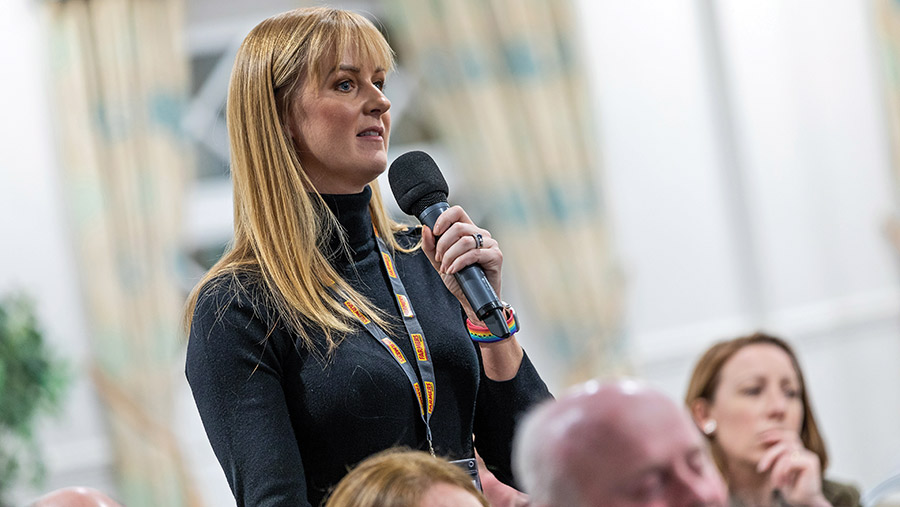 © Richard Stanton
© Richard Stanton Retail and scientific representatives joined politicians and a mainstream media journalist at the latest Question Time event in Harrogate.
Meet the panel
Sir Robert Goodwill MP for Scarborough and Whitby
Sir Robert is a farmer on a 101ha farm at Terrington, North Yorks, where his family have farmed since 1850. He is also chairman of the Environment, Food and Rural Affairs select committee.
Robbie Moore Parliamentary under secretary of state, Defra
Robbie’s responsibilities include flooding, water, resources, environment regulation and rural growth. He completed a Nuffield Farming Scholarship in 2016.
Sophie Throup Technical & sustainability director, Morrisons
Sophie heads up agriculture and sustainable sourcing policy and programmes. She is also technical and sustainability director for the firm’s manufacturing business.
Andrew Swift Executive director, Fera Science joint venture board
Andrew is an advocate of technologies to reduce environmental costs of food production and also of the circular economy.
Robyn Vinter North of England correspondent, The Guardian
A former reporter at Farmers Weekly, Robyn has written for many British national newspapers, as well as international publications.
See more: Farmers Weekly Podcast Ep 188: Heated debate over Red Tractor continues
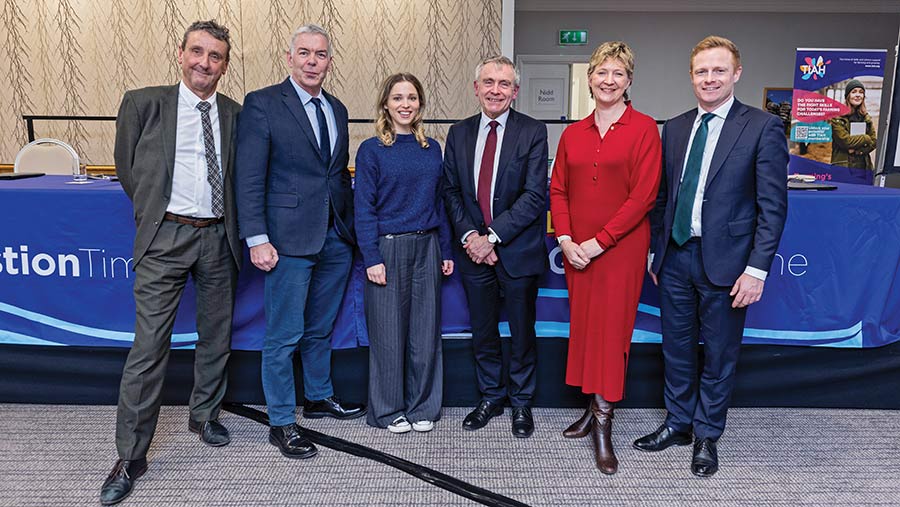
Left to right: Andrew Swift, Johann Tasker of Farmers Weekly, Robyn Vinter, Sir Robert Goodwill, Sophie Throup, Robbie Moore © Richard Stanton
Transition
We hear the word transition a lot at the moment. What are we supposed to transition to?
Defra minister Robbie Moore said he wanted to see a “directional shift” in the department to make sure food security, food production and profitability were at the heart of everything government was doing.
“[We need to make sure] we are not just constantly talking about subsidy payments through ELM [the Environmental Land Management scheme], but helping through productivity grants and removing some of the barriers associated with not allowing businesses to crack on and have as little government interference as possible,” he added.
“The word transition is constantly getting utilised through all forms of discussion, but unless policy is working at a national level practically on the ground, with a core focus on food security, it’s not working.”
Dr Andrew Swift, executive director on the Fera Science joint venture board, said the transition was all about moving to a way of producing food that had less impact on the environment.
“Globally, there will not be enough surplus area to feed the world 30 years from now unless we find more ingenious ways of producing food from the same surface area,” he said.
“We lost 1,000 species last year, 200 animals have left the planet in the last 30 years. We can’t carry on like that.”
Conservative MP Robert Goodwill, chairman of the Commons environment, food and rural affairs (Efra) select committee, said there were actually two transitions taking place – the first to a different way of delivering farm support and the second to a more environment-friendly way of farming.
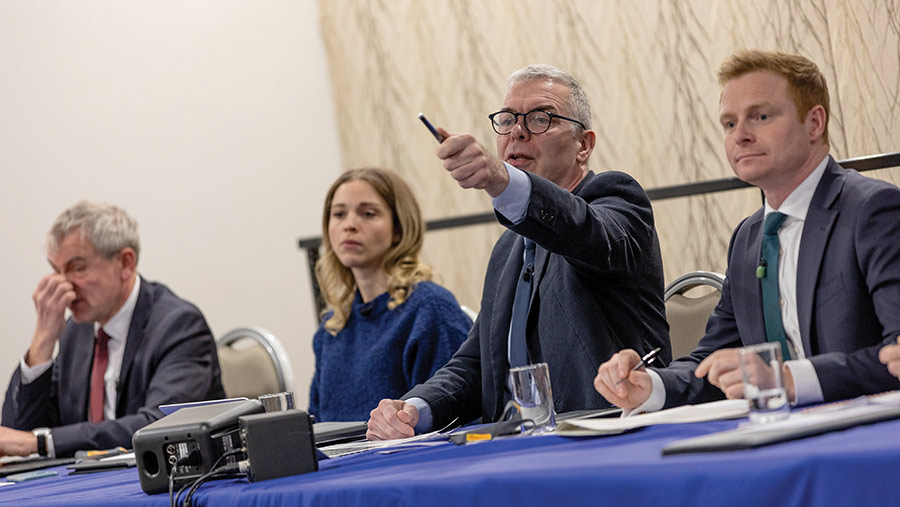
© Richard Stanton
Education
How can we ensure the next generation are accurately educated about food and farming?
Sophie Throup, Morrisons’ head of agriculture and sourcing, believes everyone in the industry has a part to play through social media and school visits to farms.
“We know from studies that it’s not always farmers talking to farmers [on social media], they are talking to others as well who haven’t really come across this space,” she said.
She added that Morrisons was doing its own school visits in store, with farmers who can talk to the pupils about the “farm-to-shelf journey”.
Guardian journalist Robyn Vinter thought many shoppers were currently “getting lost” in the arguments between vegans and farmers about what kind of food was good for them and the planet.
“From my perspective, it’s listening to consumers’ concerns and using the right messages to get to them,” she said.
Mr Moore said he believed there was “absolutely” a role for government to play in educating the next generation and that there was work to be done in bringing Defra and the Department for Education together.
He also talked about his experience of bringing children out on farm when he was part of the Glendale Agricultural Society.
“One of the biggest concerns I had was teachers coming to me from Gateshead saying ‘we’re not bringing kids up to Northumberland to watch sheep being killed to make a jumper’,” he said.
“That highlights there is a significant piece of work to do around educators as well. We’ve got some good people out there doing that, but it illustrates not everybody is on the same page.”
Dr Swift referenced a University of Nuremberg experiment which took place last year at a German retailer, where food was advertised at consumer cost and a figure which represented the environmental cost of production.
“Your bratwurst, if you chose to buy it with an environmental conscience, cost six times more than the bratwurst at the retail price,” he said.
“Clearly, no one is going to choose to spend six times more than the next person, but as an education exercise, to begin to introduce the population to understanding how much of a discount they were getting buying at consumer price, it was very successful.”
Audience comment: Paul Flynn, East Durham College
“For some reason, there’s a separation between arable farming and livestock farming. At 15 or 16 years of age, students are being asked to choose between arable and livestock and that’s not the right thing in terms of regeneration and stability. Can we have the option for a mixed farming module?”
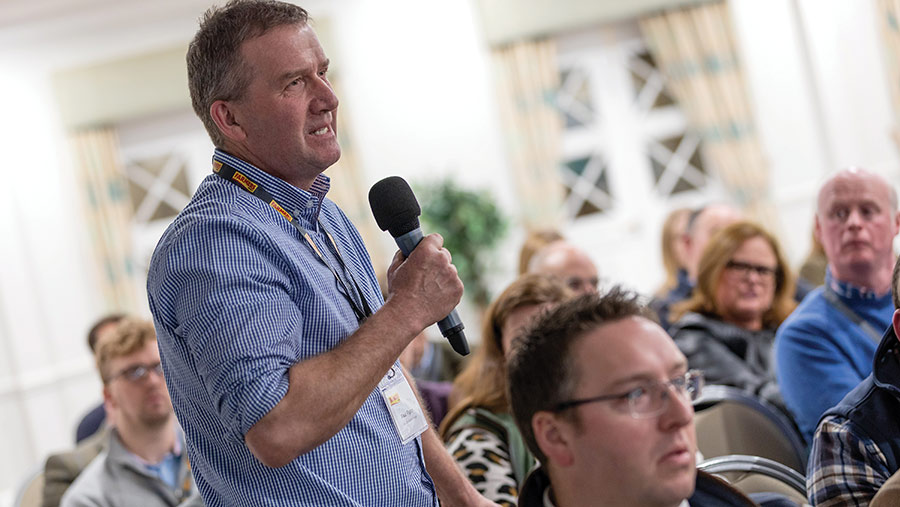
© Richard Stanton
Farmgate prices
We’ve been constantly told for the last 20-25 years that we need to diversify. Why do I, as a farmer, need to do two or three jobs to make a living?
Mr Goodwill asked what would happen if, instead of offering junior doctors a pay rise, the government encouraged them to take in lodgers, or open a shop at the end of their drive.
But he went on to say diversification was about “sweating the assets”, and explained how he had done that on his own farm, with a green cemetery business which makes twice as much profit as the farming side.
He also pointed to an inquiry his committee was carrying out into supply chain fairness and asked if the Groceries Code Adjudicator’s remit should be extended beyond direct suppliers to supermarkets.
“The supermarkets are very ruthless at pushing down prices because not only do they say they want to give good value to their customers, but they want to maximise their profits,” he said.
“If they want to have good food on the shelves, they’ve got to make sure that everybody makes a decent profit, including the farmer.”
Responding to Mr Goodwill, Ms Throup said the UK retail market was incredibly competitive and Morrisons had lost customers when its prices rose more quickly than its rivals because it has its own manufacturing businesses.
But she said the supermarket remained committed to British produce and had introduced feed tracker systems and cashflow systems, where stock is bought in advance and farmers pay back the difference on cattle when they come to slaughter.
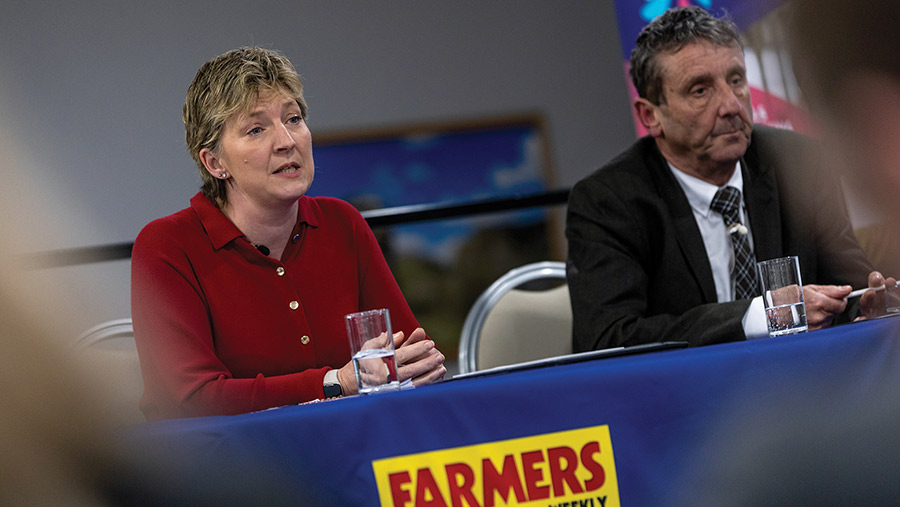
© Richard Stanton
Ms Throup was also challenged by the audience on the price of carrots over Christmas, with many farmers having to damage their soil by lifting them in wet weather.
She said: “Potentially we need to do more in thinking about how we buy them and when we’re asking you to lift them.
“And maybe do more in terms of storage for carrots as well. But I don’t think that’s necessarily going to work from a quality point of view.
“It’s not one that I have an answer for immediately, but I take your point that the price at Christmas is not really reflective when you’re thinking about the hard efforts and the very tricky environmental efforts which have gone into lifting the carrots at the time.”
Mr Moore said the government’s job was to “create options” for farmers to explore if they want to diversify.
“We’re having conversations in the department around looking at permitted development rights,” he added.
“At the moment, I think there are still some issues around there where we can free things up so people can use their assets for ELM.”
Audience comment: Phil Rowbotham
“Why is food production not profitable? That’s the crux of the matter. Our business is food production, but we’re constantly being told to do it cheaper and cheaper. I’m sorry, but unless you give us more money, the environment is finished.”
Red Tractor
Given the recent controversy surrounding Red Tractor, specifically with the Greener Farms Commitment, does the panel think the organisation is still fit for purpose?
Ms Throup said she believed Red Tractor “still absolutely has a purpose and absolutely has a value”.
She referenced research that had been done with Morrisons customers which found they valued the Red Tractor brand.
“To be honest, and this won’t be necessarily a surprise, they don’t know what everything is that it covers,” she said. “And actually I’m not surprised because I’m not sure all of us could remember everything that it covers.
“But they do know that it’s generally a good thing that they can trust and be assured that the food they’re buying is, as it says in the logo, safe and farmed with care.
“For us as well, it’s really important that Red Tractor is there.”
Dr Swift said he did not see the point in a voluntary scheme unless it is “continually raising the bar” – although he was challenged by the audience on whether it was genuinely a voluntary scheme.
“There’s no point in having a voluntary scheme which is just fulfilling the basics,” he added. “You should be aspiring to set higher standards and differentiate price.”
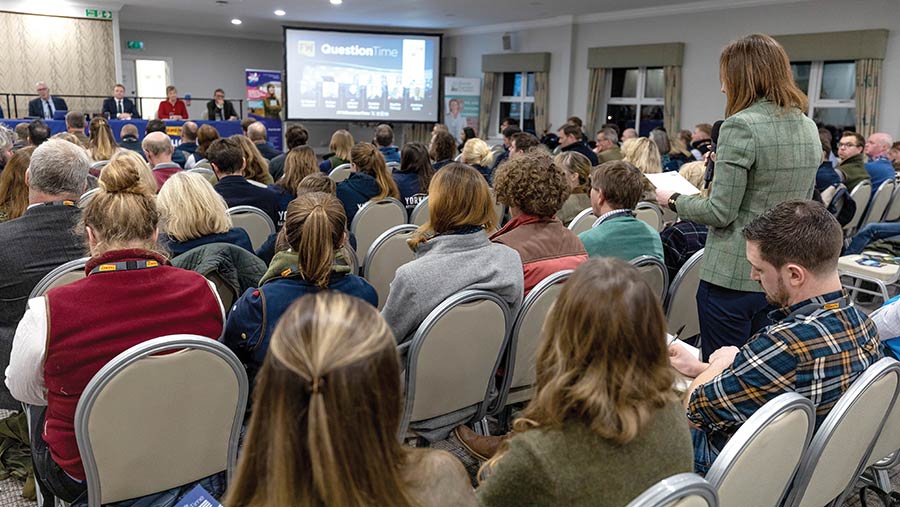
© Richard Stanton
Mr Goodwill said the reason Red Tractor was brought in was because there was a fear there would be a statutory scheme.
“If you think there’s a lot of box ticking and waiting on the voluntary scheme, imagine what happens if the politicians got hold of it,” he added. But he agreed there was a lot of “box ticking” with Red Tractor.
Audience comment: Ellie Poulton
“I deal with a lot of poultry clients in our sector. I am aware of many, many clients that have stopped in the poultry sector due to the Red Tractor standards.
“Is it really fair that these farmers, who are trying to survive, stopped due to these standards?
“Just because hand sanitiser isn’t available at a certain point or their foot dip is just a tiny bit dirty? I think it is getting ridiculous now.”
Skills and training
What skills do farmers need into the future to ensure their businesses remain successful?
Dr Swift said farmers would need to possess a huge range of skills, from accounting to economics and business practice. “I don’t see a huge amount of that,” he added.
He said it would be very important for farmers to understand ecology and biology to gauge the “true impact” of production practices on the environment.
Ms Throup suggested that an understanding of what end customers wanted was essential.
“A lot of farmers often think when [their produce] leaves the farm gate, that’s it, job’s done,” she said. “But you need to actually understand ‘what am I producing, or why am I producing it and who am I producing it for?’
“Those skills and understanding who your customer is and what they want from you is really important.”
For Mr Moore, collaboration is the key. “Don’t underestimate the power of influence that you have,” he said.
“Not only as a body, but how you can best utilise the skills that you have in terms of collaboration within the industry. Far too often we operate very much with a silo mentality.
“The more collaboration you can have and the more you can learn from one another, the better that the whole standards of the industry are.”



